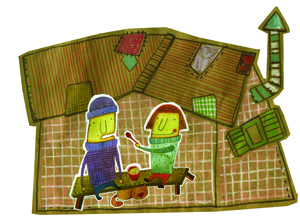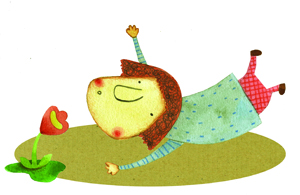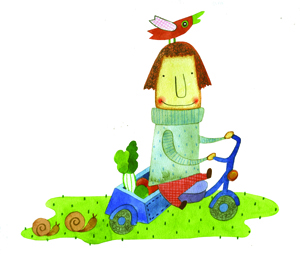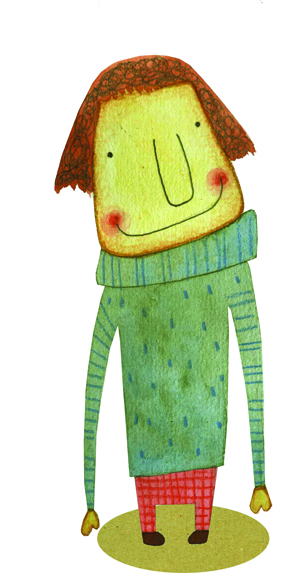

| His Big Hands, Her Crooked Hands, All Caring Hands |
| By Wu Yue-jun and Hong Su-yang Translated by Tang Yau-yang Paintings by Yongzi |
Dad’s big hands helped his daughter, a cerebral palsy victim, grow up. They helped her navigate the dark valleys through which she had to walk. Most of all, they helped strengthen her heart to face life. Now the tables have turned, and it is she—with deformed and crooked hands—that cares for him—old, sick, and demented. Her wish through it all is simple, but poignant: “I hope that Dad won’t forget me.”
"A-juan, let’s take a walk,” the father used to say to the little girl. Those were her favorite words to hear. His big hand holding her little hand, the two of them sauntered in the fields or on the countryside roads. “I could only limp along with him, but my heart sang as I followed my dad’s steps,” A-juan says, recalling the old days. The young girl had noticed that she often lost her balance and fell, scraping a knee here and bumping her head there. She was aware that something was wrong, but she did not yet really understand what was ailing her. Whenever she fell and burst into tears, her father’s strong hand would pat her on the shoulder. “That’s all right, get back up,” he would say gently. “You must be brave and strong because you can’t count on others. It’s best to learn to be independent and stand on your own feet.” He trained her to face life bravely. He was the reason she grew up to be a strong and optimistic person. Because A-juan suffered from cerebral palsy, her father suggested that she attend National Hemei Experimental School in Zhanghua, central Taiwan, which serves students with physical disabilities. The school was in a neighboring county, not very far from her home in Wuri, Taichung. Even so, it would be too inconvenient to commute every day, considering her physical condition. A teenager by then, A-juan knew she would have to live on campus. Not wanting to leave home and her father, tears began welling in her eyes. “The teachers there will teach you many things that you need to live independently in the future,” he said soothingly. “I’ll visit you every week.” He kept his promise and visited her every week until she graduated from junior high school. He usually arrived bearing her favorite treats: apples and cookies. As her father had said, the teachers in the school taught A-juan many things that allowed her to live independently, including how to do household chores and take care of herself. That was many years ago. Now she is 41 and he 83. They have swapped their roles, and for more than a decade, since he came down with Parkinson’s disease, she has cared for him with love and without complaint.
A good daughter
A-juan’s mother passed away when she was still little. Her father raised her alone, so the two of them have always been very close. She grew up under his guidance into a person as self-reliant as one with cerebral palsy can hope to be. More than a decade ago he was diagnosed with Parkinson’s disease, which gradually deprived him of the ability to do many everyday things. He eventually became entirely dependent upon her for everything. Though she herself has difficulties controlling her physical movements, she has made up for those deficiencies with her unfathomable determination to give him the best care she can. Every morning after she has freshened herself up, she washes her dad’s face and brushes his teeth. Then she rides her bicycle to the market to shop for groceries. It takes a lot of effort for her to pedal, her body wobbling with the rhythm of the bicycle.
She returns home with Chinese vermicelli soup—which her dad loves. Then she pours it into a bowl and waits on him as he eats. She always waits until he has finished before she herself eats. At night, she sleeps by his side so she can detect any signals from him and attend to his needs. “Sometimes Dad doesn’t want to get up to go to the bathroom. I have to drag him out,” she says as she rolls up her sleeve to show off her strong arm. “This is all thanks to Dad’s training.” His condition has rapidly worsened in recent years. He has even developed symptoms of dementia. He often wakes her in the middle of the night. “He even hit her with a walking stick,” a woman next door said, “and threw his urine on her.” Hearing those words, A-juan smiled and defended her father: “He’s not feeling well, and he’s not himself. I don’t get mad at him.” She always washes their clothes by hand. “The clothes are cleaner this way; besides, it saves on water and electricity,” she explained. After taking in the clothes she hangs out to dry, she folds them very neatly and puts them tidily away. Her left hand is calloused from all the housework, and the fingers are deformed and crooked. Her right arm and hand are weak, so her left hand has to do all the heavy work. She said that she actually enjoys doing the household chores. “When I’m absorbed in a chore, my mind is tranquil and I forget all my pain. Doing housework has become my specialty.” After junior high school, she worked at a hotel as a janitor for five years. Though she could not work very fast, she gave it her best. That was the only work experience she has ever had. She cherishes those years of gainful employment, during which she stashed away every dollar she had earned for a rainy day. “We have to look a little farther down the road and plan ahead,” she remarked.
Helping others A-juan’s home was flooded when Typhoon Kalmaegi hit Taiwan in 2008. Tzu Chi volunteers met her and her father when they went to the disaster areas and helped victims clean up their homes and communities. Volunteers have visited their home at least once a month ever since to check on how they are doing. “One night Dad came down with a cold, and he was very feeble. I called Brother Chen and asked for his help,” A-juan recalled. After receiving her call, volunteer Chen Jin-sheng (陳金盛) rushed over and took the old man to the clinic of Dr. Chen Wen-de (陳文德), a member of the Tzu Chi International Medical Association.
Chen Jin-sheng helps the father-daughter pair in other ways too, such as clipping fingernails for A-juan’s father or painting their home, a simple one-story dwelling. “Though physically disabled, A-juan is extremely strong and brave,” Chen said. “She does an excellent job of housekeeping and takes great care of her dad. She’s our role model. She reminds me of the need to be extra mindful, understanding, and patient when I look after my own aging father.” A-juan’s body leans to the right due to the cerebral palsy, causing excessive wear on some of her bones. She needed to undergo surgery to correct that, so after talking with her maternal grandmother, she temporarily put her father into a nursing home that a relative operated. She was very unaccustomed to her father’s absence. When volunteers went to visit her, she cried like a baby. She told them that she had gone to see her father, but he hadn’t recognized her. “I regret having sent him away,” she said with a shaking voice. Chen tried to comfort A-juan: “Don’t be so sad. We’ll get him back after you’ve recovered from your surgery.” A neighbor, Mrs. Chen (no relation), said, “A-juan has been extremely loving in the care of her father. All of us in the neighborhood are really moved. She’s a good girl, so I come over to chat with her when I have a moment.” A-juan has other friends, too: the aunt who helped care for her until she was six years old while A-juan’s dad was away serving in the military, a woman next door, members of a local community association, and Tzu Chi volunteers. A-juan has made monthly donations to Tzu Chi for several years now. She keeps a coin bank at home to collect spare change, which she also donates. “I want to help people even needier than me,” she said with a smile. “I never feel sorry for myself, because I do have arms and legs and I can still give to others.” Though her body is deformed and her mobility impaired, she is nonetheless optimistic and sunny. She harbors wholesome thoughts, takes good care of her dad, and tries whenever she can to do good. She has made her life shine in its own way. |
















|




